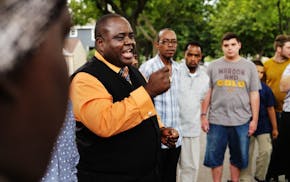Brooklyn Center will have a public safety commission after all, but its role in shaping city safety policies will be less sweeping than originally proposed.
The City Council on Monday approved the scaled-back version of the commission after months of debate during which the council majority had signaled it could repeal the creation of the group.
Creating the advisory commission was one of the goals laid out amid calls for reform following the police killings of Daunte Wright and Kobe Dimock-Heisler. The City Council in December voted 3-2 to establish the commission that would advise the city on police and violence prevention policies.
But with a new member this year shifting the council majority, the establishment of the commission was put on hold for months as the council debated its scope. The issue has led to heated debate and packed council meetings, with residents pushing for reform fearing the council could roll back attempts at change.
Tensions reached a boiling point in a late March meeting when three council members said amendments to the commission didn't go far enough and discussed a vote to repeal it. Residents and activists packed the next council meeting to push for approval of the commission.
After tabling the issue and making more changes to the police advisory board's duties and makeup, the council voted 4-1 Monday to establish it. Council Member Laurie Ann Moore, who joined the council this year and has said she wholly opposes the commission, was the lone "no" vote.
"It was just another watered down version of the big changes they promised," Katie Wright, Daunte Wright's mother, said in an interview after the meeting.
Still, residents said they were grateful that a version of the commission was approved. Wright said the panel is "going to keep our community safer."
"It's baby steps," she said. "We'll keep on pushing. Just because they passed it and it's all said and done doesn't mean it's over. We'll still be here."
Push for police reform
The previous council in December created the commission to review city policies, develop a community safety and violence prevention plan, and make recommendations on the city's handling of protests, among other tasks.
Establishing the body would fulfill one of the goals city leaders agreed to as part of a wide-ranging police reform resolution, spelled out amid protests four years ago following Daunte Wright's 2021 police killing.
An officer fatally shot Wright, 20, at a traffic stop. The resolution also honored Dimock-Heisler, 21, who was killed at home in 2019.
Since adopting the goals, the city has made some strides, such as piloting a program where medical professionals help respond to mental health calls and creating an office that takes a health-based approach to public safety.
In a blow to activists, the council in January 2024 voted 3-2 against a resolution that would have restricted police from making traffic stops for minor infractions such as broken windshield wipers.
Early this year, with one new member sworn in, the council froze the establishment of the public safety advisory commission and began debating its reach.
Mayor April Graves recommended the commission feature six voting members who are city residents, as well as four nonvoting advisers, such as experts on health or the judicial system, without a residency requirement.
Council Member Dan Jerzak pushed back, arguing against having advisers on the board who are not Brooklyn Center residents. He also worried about "mission creep," with other opposing members raising concerns about the commission reviewing the police collective bargaining agreement and having a hand in other recommendations.
On Monday, the council approved the commission without the four nonvoting members. It also narrowed a list of 13 duties the board approved in December to two broader responsibilities: Recommending innovative approaches to public safety, and reviewing and advising on city policies.
Specific mentions of creating a comprehensive safety plan, considering policies on protests and reviewing the collective bargaining agreement were taken out.
Tensions boil over
The creation of the commission had become increasingly heated, including at the late March meeting, after city staff presented an edited resolution outlining the goals of the commission, aiming for a compromise.
Jerzak said the changes didn't go far enough.
Council Member Kris Lawrence-Anderson said the document was "improved," but she still found issues, including with the commission working on a community safety and health plan. Graves later asked Lawrence-Anderson to elaborate.
"Overall, I just don't support it," she said.
"Why?" the mayor asked.
"I don't have to tell you," Lawrence-Anderson said.
Residents in the crowd reacted and started speaking among themselves. Moore, who was sworn in this year, interjected to call for order due to the noise.
The mayor went on to speak in favor of the commission, saying other cities have created similar advisory bodies, and she felt the council was not representing the community, whose residents are predominantly people of color.
Crowd members applauded. Moore spoke over the mayor to call for order again. Graves picked up her gavel.
"You going to throw it at me?" Moore asked the mayor.
"Do you want me to?" the mayor responded. "I didn't act like I was going to."
Moore interrupted and said she didn't know why the mayor picked up the gavel. Graves banged the gavel to call for order.
"I've never used this before," Graves said. "Stop interrupting me. You told me before to let you know if I felt disrespected. I'm letting you know right now."
Graves said Moore has repeatedly spoken over her and her patience was running out. Moore called for another "point of order" and said the mayor is "supposed to have meeting decorum."
"There's been plenty of decorum until you arrived," Graves said to Moore.
Worried about the future? We predict you'll read this story about a high-profile St. Paul astrologer

Head of violence interruption program in Twin Cities charged with stealing $150,000 in employee wages
Police identify victim of homicide on St. Paul's West Side

